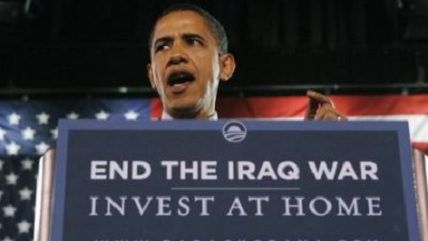Polls Show Hawkishness on Iraq, But Doubt About Obama's Prowess

President Obama just gave a speech condemning the beheading of an American freelance journalist by terrorist group the Islamic State (also known as ISIL or ISIS), ordered more airstrikes, and military officials are hinting that more troops could be deployed to Iraq soon. How do Americans feel about another chapter in the Iraq War? There are hints of hawkishness, but concern – especially among millennials – that the Obama Administration is not actually capable of executing a quick, effective campaign against ISIL.
A USA Today-Pew poll released on Monday found that "44 percent of Americans believe the U.S. bears a responsibility to 'do something' about the violence," while 41 percent do not. Last month, only 39 percent believed the U.S. ought to do something and 55 percent believed it didn't. Interestingly, the survey also found that "those under 30 are less likely to approve of airstrikes than older Americans are, and they are much more likely to express concern about the risks of an expanding U.S. engagement in Iraq. By more than 3-1, 18-to-29-year-olds worry more that the U.S. will get too involved."
"The United States of America will continue to do what we must do to protect our people," asserts Obama, but what exactly is it that we must do?
Pew suggests that 54 percent of the public supports airstrikes. Republicans are collectively more gung-ho than average with 70 percent support. The majority of Democrats (54 percent) are on board with airstrikes, but an even larger portion (62 percent) of the party is skeptical that such a strategy will "confront this awful terrorism and replace it with a sense of hope and civility" as Obama stated earlier today.
And, again, young people seem to be the most cautious:
Nearly seven-in-ten of those under 30 (68 percent) say their greater concern about U.S. military action in Iraq is that the U.S. will get too involved in the situation; just 21 percent are more concerned that the U.S. will not go far enough stopping the Islamic militants. Among those 65 and older, about as many are more concerned that the U.S. will get too involved (41 percent) as worry it will not do enough to stop the militants (39 percent).
This wariness may shed light on broader findings from a recent Reason-Rupe poll, which reported "37 percent of Americans approve of the job President Obama is doing on foreign policy, while 53 percent disapprove."
And, despite expressing support for dropping bombs, Rasmussen research last week found "68 percent of all voters believe the militants are likely to succeed in taking control of Iraq anyway," and as of last month, belief in the notion that America is winning the "War on Terror" has fallen to a 10-year low, according to another Rasmussen survey.
It's hard to blame Americans for their skepticism. As Foreign Policy's Gordon Lubold points out, the White House is struggling not only to fight the Islamic State, but even to simply define its goals and objectives in Iraq. And, ISIL's forces have grown by an estimated 6,000 in the last month.


Show Comments (28)